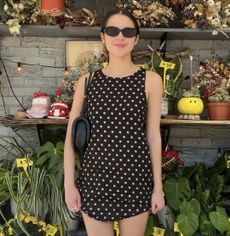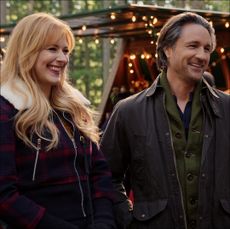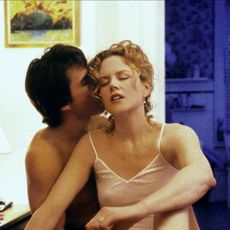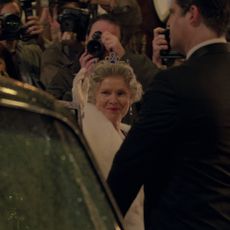The Plot: While we've heard a lot about adopted children searching out their birth children, novelist AM Homes was 31-years-old when her biological mother came looking for her. Except mom wasn't the dolled-up fantasy parent she always imagined — just a lonely, eccentric old woman craving connection. Equal parts curiosity and skepticism, Homes sets out to understand her family's past, and what it means about her future.
LAUREN (Articles Editor): I know Homes is a great novelist but to me, this memoir felt like she was cashing in.
YAEL (Associate Editor): It's a great argument for not telling your kid that they're adopted. Maybe there are some things that are better left unknown.
JOANNA (Editor in Chief): Really? You can't be serious. Nothing's more important that knowing where you come from.
EILEEN (Editorial Assistant): I might be biased because I'm a really big fan of her other books. Which are pretty dark. "In a Country of Mothers," the main character goes to a psychiatrist and talks about being adopted, and the psychiatrist realizes the patient is really her biological daughter and begins to stalk her. It's interesting to see parallels in her own life.
ABIGAIL (Deputy Editor): I don't think I'd call this book dark though. Just cynical.
LAUREN: Yeah…and melodramatic. When she says "the deep chaos that has been my existence…"? Please, she's adopted, not a former child soldier.
Stay In The Know
Marie Claire email subscribers get intel on fashion and beauty trends, hot-off-the-press celebrity news, and more. Sign up here.
YAEL: Or how about when she says about her biological dad, "I imagine him fucking me." I don't know if that's dark or just wrong.
JOANNA: Er, wrong!
EILEEN:I don't remember that but I'm glad I blocked it out.
LAUREN: Ugh, that was so blatantly Freud! The sexual tension she created with her father creeped me out. Maybe this is my own warped mind, but given the title The Mistress's Daughter, I kept thinking the fact that she had been bred of this affair was going to play a bigger role in the way she defined herself. You know, what does it say about me? Am I a slut, too?
ABIGAIL: Well, I did like the idea of looking into her identity. I mean, I've been lucky enough to see my own grandparents grow old. I see elements of myself in them and it gives me a hint about how I might handle things later in life. So I can understand wanting to know where you come from.
YAEL:What did you guys think about the way her Jewish upbringing played into it? She was so fixated on this idea of never having a Christmas tree and how because of that her family wasn't normal. And now, she has this biological father who does celebrate the Christmas but never invites her in. It reminded me of that Curb Your Enthusiasm when Larry David thinks he'd been adopted, finds his biological parents who weren't Jewish and suddenly he was able to let go of all of his stereotypical Jewish neuroses.
LAUREN: I wanted to know more about her adoptive parents. She says in one paragraph that she never felt her adoptive mother really loved her because she had once lost a son. And that's it! Moving on… And I was like, that's a whole book right there! That was the real stuff! But she never really went into it. The rest of it — with all the genealogy stuff — read like she was ranting in a journal that she kept and decided to publish.
YAEL: She never put it all out there, — and I don't blame her — I wouldn't want the whole world to know my business either. The idea of a memoir, working out very personal stuff in the public sphere, is kind of bizarre. That said, if you commit to writing one, you have to be prepared to lay yourself bare. Don't you?
JOANNA: It's a bit of a con to us poor readers if she doesn't.
ABIGAIL: At least the writing was really nice.
LAUREN: Yeah—that part when her biological mother is begging to meet her, and Homes writes "I am tempted to tell her, You can't see me right now, because right now I am not visible to anyone, even myself. I have evaporated." Evaporated. It was such an interesting way of saying it.
YAEL: My favorite line was when she says "I was suffering the deafness that comes in moments of great importance." I've definitely experienced that. When someone's telling you the most important piece of information you've ever heard and ten minutes later you can't remember the details. It's just too bad the story felt incomplete. But it's probably incomplete in her own life, too.
-
 Olivia Rodrigo Finds the Perfect Spring Dresses at Reformation
Olivia Rodrigo Finds the Perfect Spring Dresses at ReformationShe's worn the brand twice in the past week.
By Julia Marzovilla Published
-
 Curiously, Just as Meghan Markle Sends Samples of Her New Strawberry Jam Out, the Buckingham Palace Shop Starts Promoting Its Own Strawberry Jam on Social Media
Curiously, Just as Meghan Markle Sends Samples of Her New Strawberry Jam Out, the Buckingham Palace Shop Starts Promoting Its Own Strawberry Jam on Social MediaThe clip promoting the Buckingham Palace Shop’s product—we cannot make this up—is set to Mozart’s “Dissonance Quartet.”
By Rachel Burchfield Published
-
 Zendaya's Latest 'Challengers' Serve Is Nearly a Century Old
Zendaya's Latest 'Challengers' Serve Is Nearly a Century OldThe 1930s-era dress may have been pulled months ago.
By Halie LeSavage Published
-
 The Best Bollywood Movies of 2023 (So Far)
The Best Bollywood Movies of 2023 (So Far)Including one that just might fill the Riverdale-shaped hole in your heart.
By Andrea Park Published
-
 ‘Bachelor in Paradise’ 2023: Everything We Know
‘Bachelor in Paradise’ 2023: Everything We KnowCue up Mike Reno and Ann Wilson’s “Almost Paradise."
By Andrea Park Last updated
-
 Who Is Gerry Turner, the ‘Golden Bachelor’?
Who Is Gerry Turner, the ‘Golden Bachelor’?The Indiana native is the first senior citizen to join Bachelor Nation.
By Andrea Park Last updated
-
 ‘Virgin River’ Season 6: Everything We Know
‘Virgin River’ Season 6: Everything We KnowHere's everything we know on the upcoming episodes.
By Andrea Park Last updated
-
 The 60 Best Musical Movies of All Time
The 60 Best Musical Movies of All TimeAll the dance numbers! All the show tunes!
By Amanda Mitchell Last updated
-
 'Ginny & Georgia' Season 2: Everything We Know
'Ginny & Georgia' Season 2: Everything We KnowNetflix owes us answers after that ending.
By Zoe Guy Last updated
-
 35 Nude Movies With Porn-Level Nudity
35 Nude Movies With Porn-Level NudityLots of steamy nudity ahead.
By Kayleigh Roberts Last updated
-
 The Cast of 'The Crown' Season 5: Your Guide
The Cast of 'The Crown' Season 5: Your GuideThe Mountbatten-Windsors have been recast—again.
By Andrea Park Published